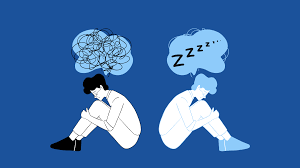 Real Blogger Outreach – Powerful Links. Zero Spam.
Real Blogger Outreach – Powerful Links. Zero Spam.
When Insomnia Becomes Dangerous: Understanding the Risks and Seeking Help
Written by Jones Smith » Updated on: June 17th, 2025

In today's fast-paced world, sleep disorders are becoming increasingly common. Insomnia, in particular, affects millions of people worldwide. While occasional sleepless nights may not be cause for concern, when insomnia becomes chronic and persistent, it can have serious consequences for our overall health and well-being. In this blog, we will explore when insomnia becomes dangerous and why seeking help is crucial for finding relief.
1. The Health Impact of Chronic Insomnia:
Chronic insomnia is defined as difficulty falling asleep or staying asleep for at least three nights a week for three months or more. Insufficient or poor-quality sleep can severely impact various aspects of our health, including:
a) Mental health: Insomniais strongly linked to mood disorders such as depression and anxiety. Ongoing sleep deprivation can exacerbate these conditions, leading to a vicious cycle of poor mental and emotional well-being.
b) Physical health: Lack of sleep weakens our immune system, leaving us more vulnerable to illnesses. It also increases the risk of chronic conditions like cardiovascular disease, obesity, diabetes, and even certain types of cancer.
2. Impaired Cognitive Functioning:
Sleep is essential for optimal cognitive functioning. Chronic insomnia affects our ability to concentrate, make decisions, and process information. This can significantly impact performance at work or school, making simple tasks more challenging and leading to errors or accidents. Additionally, memory problems and reduced creativity are common consequences of ongoing sleep deprivation.
3. Increased Risk of Accidents:
Fatigue resulting from insomnia can make us more prone to accidents. Drowsy driving, in particular, is a major concern. The impaired reaction time, decreased alertness, and lack of focus can lead to devastating consequences on the road. It is estimated that drowsy driving results in thousands of accidents and fatalities each year.
4. Relationship and Social Impact:
Sleeplessness can take a toll on relationships, leading to irritability, moodiness, and conflicts with loved ones. Constant fatigue may limit participation in social activities, leading to feelings of isolation and withdrawal from meaningful connections.
5. Treatment Options and Seeking Help:
It is essential to recognize when insomnia becomes a dangerous problem and seek professional help. Ignoring ongoing sleep issues can exacerbate physical and mental health problems over time. There are various treatment options available, including:
a) Therapy: Cognitive-behavioral therapy for insomnia (CBT-I) is a highly effective form of therapy that helps address the underlying causes of sleep disturbances and teaches strategies to improve sleep patterns.
b) Medication: In some cases, sleep medications may be prescribed temporarily to help break the cycle of sleeplessness. However, this should be done under the guidance of a healthcare professional.
c) Lifestyle changes: Improving sleep hygiene, such as following a consistent sleep schedule, creating a conducive sleep environment, and practicing relaxation techniques, can significantly improve sleep quality.
Conclusion:
When insomnia becomes chronic and persistent, it can pose serious risks to our physical health, mental well-being, cognitive functioning, and overall quality of life. Recognizing the dangers of insomnia and seeking help is crucial for finding effective treatment and reclaiming restful nights. Don't suffer in silence – prioritize your sleep health and take the necessary steps to address any ongoing sleep issues. Remember, a good night's sleep is a vital component of leading a happy, healthy, and fulfilling life.
Note: IndiBlogHub features both user-submitted and editorial content. We do not verify third-party contributions. Read our Disclaimer and Privacy Policyfor details.
Copyright © 2019-2025 IndiBlogHub.com. All rights reserved. Hosted on DigitalOcean for fast, reliable performance.










